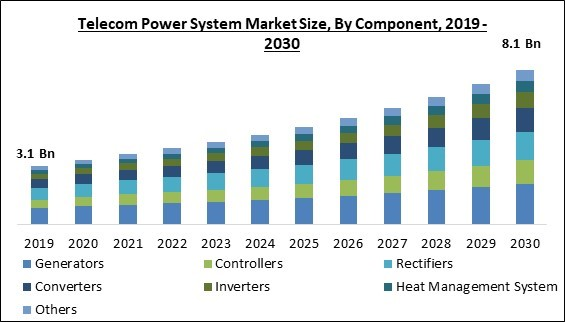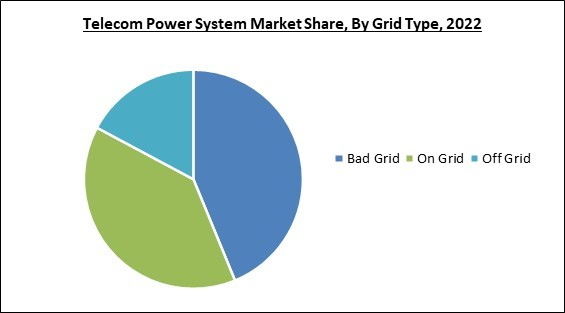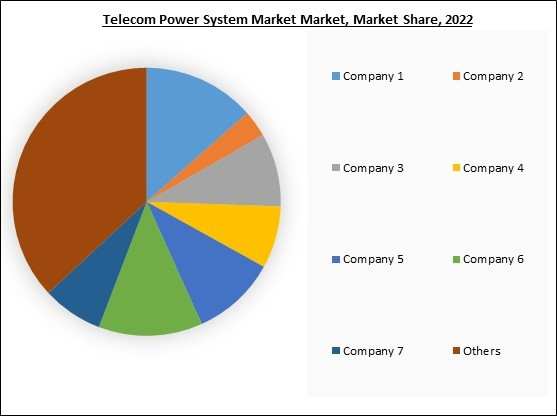The demand for inverters is anticipated to increase dramatically over the coming years due to expanding interest in renewable energy sources and the adoption of electric vehicles. Hence, the inverter segment acquired $364.1 million revenue in the market in 2022. The inverter segment's primary goal is to offer reliable and efficient power conversion solutions for various applications. The growing use of electric vehicles is also driving the demand for inverters. The increased need for high-efficiency power conversion technologies and reliable power backup solutions is also fuelling the expansion of the inverter segment. Some of the factors impacting the market are growing remote telecom infrastructure, increasing cellular network technology (5G, LTE, etc.), and design issues and material costs.
Rural areas in developing nations like Brazil, Africa, and India have seen a growth in demand for mobile, telephony, and data services. Telecom service providers and mobile network operators are spreading their networks from urban and semi-urban areas to rural regions to tap into the market potential of the rural market in developing economies. With the growth in technological breakthroughs in the telecommunications industry, the need for power-efficient networks also increases. Along with improving the energy efficiency of these devices, power systems, cooling systems, and batteries, there is a growing requirement for effective power management solutions. The requirement for telecom power systems would significantly rise due to the expansion of users and telecom infrastructure in rural areas. The demand for high-efficiency telecom power systems has grown, notably from developing nations like India. This is due to the increasing adoption of 4G technology. In developing nations all over the world, this is anticipated to fuel the demand for telecom power systems. Additionally, wealthy nations like the US and Japan are embracing technology developments like introducing 5G services. The GSM Association predicts that by 2025, there will be 15% of 5G connections globally. Thus, the rising deployment of 5G and 4G is expected to increase the expansion of the market in the coming years.
However, Due to greater operational expenses and low return on investment, telecom operators encounter infrastructure-related difficulties when extending network coverage to rural and remote areas. Due to the absence of power infrastructures, remote locations, harsh climatic conditions, and frequently a lack of qualified personnel, deploying telecom networks in emerging markets is both a technical and economic challenge. Renewable energy sources like diesel-wind, diesel-solar, etc., should provide most of the energy required to produce electricity. The difficulty in promoting the awareness of such products and the high installation costs of renewable energy sources are making it difficult for telecom power systems manufacturers to develop products. Thus, owing to factors like design issues and considerable costs of raw materials, the growth of the market may hamper.
Grid Type Outlook
Based on grid type, the market is divided into on-grid, off-grid, and bad grid. The on-grid segment garnered a significant revenue share in the market in 2022. A power generation system connected to the utility grid is an on-grid system. The system transmits the electricity it generates to the utility, which powers multiple appliances. These grid solutions are the easiest, most affordable, and most likely to pay for themselves in 3 to 8 years by reducing utility costs.Component Outlook
By component, the market is classified into rectifiers, inverters, convertors, controllers, heat management systems, generators, and others. In 2022 the generators segment held the highest revenue share in the market. Generators are most likely to predominate across all components since they offer reliability and prolonged long hours in remote locations without compromising performance. In the telecommunications sector, generator use has been constant. Diesel fuel is readily available and has a low initial setup cost since diesel generators are the most popular portable power sources.Power Rating Outlook
On the basis of power rating, the market is segmented into below 10 kW, 10-20 kW, and above 20 kW. In 2022 the below 10 kW segment dominated the market with maximum revenue share. Several telecom components utilize power supplies below 10 kW due to their advantages, including lower cost, weight, and dimension. Cell phone towers, base transceiver stations (BTS), 5G antennas, base stations for telecom towers, microcell base stations, 4G towers, and UPS systems are a few applications for low-output telecom power systems.The leading players in the market are competing with diverse innovative offerings to remain competitive in the market. The above illustration shows the percentage of revenue shared by some of the leading companies in the market. The leading players of the market are adopting various strategies in order to cater demand coming from the different industries. The key developmental strategies in the market are Acquisitions, and Partnerships & Collaborations.
Power Source Outlook
By power source, the market is fragmented into diesel-battery, diesel-solar, diesel-wind, and multiple power sources. The diesel-solar power source segment projected a prominent revenue share in the market in 2022. The increased demand for low-cost hybrid energy sources is the primary factor propelling the growth of the segment. A photovoltaic solar power system and a diesel energy source are combined to create a diesel-solar system. These systems are reliable and contribute to lowering maintenance, operational, and logistics costs by reducing fuel usage and diesel runtime. Hybrid power sources are gaining prominence due to the increasing need to reduce carbon footprint, driving the use of green telecom infrastructure over the forecast period.Technology Outlook
Based on technology, the market is categorized into AC systems and DC systems. In 2022 the DC systems segment led the market by generating highest revenue share in 2022. DC power systems have numerous applications in data centers, telecommunications, electric vehicles, commercial buildings, residential homes, and aircraft. Low-voltage 48 Vdc systems are used in DC distribution systems in data centers and telecommunications networks to increase flexibility, efficiency, and reliability while lowering system costs. This factor drives the demand for DC power systems in these sectors.Regional Outlook
Region-wise, the market is analyzed across North America, Europe, Asia Pacific and LAMEA. In 2022 the Asia Pacific region led the market by generating the highest revenue share. The rapid digital transformation of many industries in emerging nations is responsible for expanding the market in the Asia Pacific region. It presents an industry opportunity for telecom operators to build a sustainable ecosystem. In addition, countries such as India, South Korea, and China have made substantial strides in developing their telecom services, paving the way for start-ups focusing on emerging trends in digital services, such as cloud computing, network security, and better-connecting technologies. As a result, there has been a considerable increase in the telecom sector's growth, driving up demand for regional telecom power systems.The market research report covers the analysis of key stake holders of the market. Key companies profiled in the report include Eaton Corporation Plc, Huawei Technologies Co., Ltd. (Huawei Investment & Holding Co., Ltd.), Cummins, Inc., ZTE Corporation, General Electric Company, Delta Electronics, Inc., Hangzhou Hikvision Digital Technology Co., Ltd., ABB Group, Corning Incorporated, and Schneider Electric SE.
Scope of the Study
Market Segments Covered in the Report:
By Component
- Generators
- Controllers
- Rectifiers
- Converters
- Inverters
- Heat Management System
- Others
By Grid Type
- Bad Grid
- On Grid
- Off Grid
By Power Rating
- Below 10 KW
- 10 - 20 KW
- Above 20 KW
By Power Source
- Diesel-Battery
- Diesel-Wind
- Diesel-Solar
- Multiple Power Sources
By Technology
- DC Systems
- AC Systems
By Geography
- North America
- US
- Canada
- Mexico
- Rest of North America
- Europe
- Germany
- UK
- France
- Russia
- Spain
- Italy
- Rest of Europe
- Asia Pacific
- China
- Japan
- India
- South Korea
- Singapore
- Malaysia
- Rest of Asia Pacific
- LAMEA
- Brazil
- Argentina
- UAE
- Saudi Arabia
- South Africa
- Nigeria
- Rest of LAMEA
Key Market Players
List of Companies Profiled in the Report:
- Eaton Corporation Plc
- Huawei Technologies Co., Ltd. (Huawei Investment & Holding Co., Ltd.)
- Cummins, Inc.
- ZTE Corporation
- General Electric Company
- Delta Electronics, Inc.
- Hangzhou Hikvision Digital Technology Co., Ltd.
- ABB Group
- Corning Incorporated
- Schneider Electric SE
Unique Offerings
- Exhaustive coverage
- The highest number of Market tables and figures
- Subscription-based model available
- Guaranteed best price
- Assured post sales research support with 10% customization free
Table of Contents
Companies Mentioned
- Eaton Corporation Plc
- Huawei Technologies Co., Ltd. (Huawei Investment & Holding Co., Ltd.)
- Cummins, Inc.
- ZTE Corporation
- General Electric Company
- Delta Electronics, Inc.
- Hangzhou Hikvision Digital Technology Co., Ltd.
- ABB Group
- Corning Incorporated
- Schneider Electric SE











